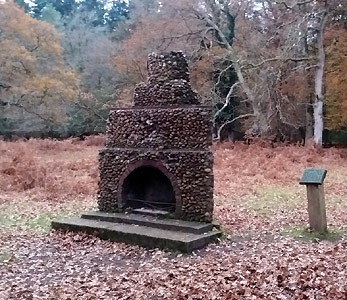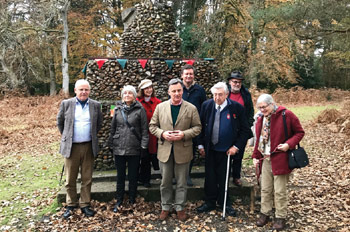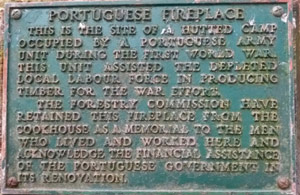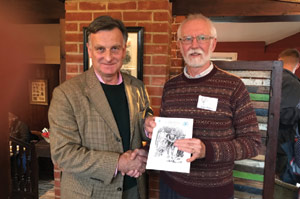Home | About Us | Subscribe | Advertise | Other Publications | Diary | Offers | Gallery | More Features | Obituaries | Contact |
|
|
|
|||||||
Fr Ulick Loring, Parish Priest, Church of St James, Twickenham, has been inspired to commission two beautiful stained-glass memorial windows, one of which is dedicated to the Portuguese fallen of the First World War and the other dedicated to the last King of Portugal, Dom Manuel II, in recognition of his humanitarian work in the care of the wounded. The unveiling of both these War Memorial Windows will be on Monday 9th April 2018, the Centenary Anniversary of the Battle of the Lys, and Remembrance Day in Portugal.
Two former Chairmen of the Anglo-Portuguese Society, Bernard Hornung and Robert Wilson, responded to a very kind, thoughtful, and long-standing invitation received from John Ward, Chairman of the New Forest Association. We took a group from London to join a party from the New Forest Association at the New Forest Inn, Emery Down, for lunch. Over a glass of Port, John Ward received a copy of Malcolm Howe’s book on King Manuel II, before we set off to view the Portuguese Fireplace. On arrival at the resplendent fireplace decked in Portuguese Flags and red and green pennants, we received a most interesting talk given by a local historian, raised another glass, enjoyed cinnamon toast made by Maria Allen, and a lovely walk in the New Forest.
Portuguese troops were employed at a number of camps including at: Virginia Water, Mortimer, Lyndhurst, Mamhead, and Ampthill. By August 1918, some 2,500 Portuguese Troops were stationed in Britain assisting with the war effort. As soon as accommodation had been arranged, either in premises taken over, or in huts, quartermasters and stores were sent, followed by advance parties of up to 40 Portuguese, the strength being brought up to 100 to 150 men for each camp. However, the situation at Lyndhurst was slightly different as the Canadian Forestry Corps set up the camp, and then received help from 100 Portuguese who arrived in November 1917. The camp was surrounded by four fences of various sizes and also included a mess room, canteen, sleeping quarters, wash and bath houses, tailors and boot shops, laundry, drying room, cookhouse, hospital, and non-commissioned officer’s quarters. Electricity was also included. Guards were positioned at wooden and barbed wire gates as well as at strategic points around the camp. The Canadians were better equipped than the Portuguese who at one stage went on strike because they were not given oilskins. The Portuguese in their lightweight uniforms would have had a point.
|
|||||||
|
|||||||

 The Portuguese Fireplace in the New Forest
The Portuguese Fireplace in the New Forest The author (centre) and Robert Wilson (far left), two former Chairmen of the Anglo-Portuguese Society, with the group who visited the Portuguese Fireplace
The author (centre) and Robert Wilson (far left), two former Chairmen of the Anglo-Portuguese Society, with the group who visited the Portuguese Fireplace The Plaque at the Portuguese Fireplace
The Plaque at the Portuguese Fireplace The author presenting John Ward with a copy of Malcolm Howe’s book on Dom Manuel II, the last King of Portugal
The author presenting John Ward with a copy of Malcolm Howe’s book on Dom Manuel II, the last King of Portugal